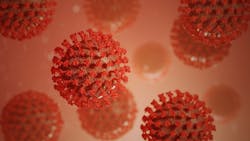IgA antibodies protect the unvaccinated against COVID-19
To understand how the immune system builds up its defenses against COVID-19, a group of researchers at the University’s Sahlgrenska Academy monitored 156 employees at five primary care health centers, belonging to the Nötkärnan group in the Gothenburg area, for six months, according to a University of Gothenburg news release.
Recruited during April and May 2020, none of them had been vaccinated against COVID-19, and most of them met infected patients daily.
The reason why some of the staff did not contract the disease seems to have been that IgA (immunoglobulin A) was present in their respiratory tract. These antibodies, found naturally in the secretions of mucous membranes in the airways and gastrointestinal tract, can protect the body by binding to viruses and other invading organisms.
One in ten protected
The results of the study, published in the European Journal of Immunology, show that a third of the care workers developed antibodies to COVID-19. These subjects fell into two distinct groups based on antibody patterns and COVID-19 incidence.
One group, who had IgA antibodies only, never succumbed to COVID-19. Participants in the other group had both IgG antibodies and T cells and contracted the disease. The acquired immune system also includes IgG antibodies and T cells, which serve to recognize viruses, for example, and protect us against them.
Christine Wennerås, Professor of Clinical Bacteriology at Sahlgrenska Academy, University of Gothenburg, stated, “We all have IgA. It’s found on the mucous membranes, and COVID-19 is an infection that spreads via those membranes. We thought it was important to investigate what happened when completely healthy people encountered the coronavirus before vaccines became available.”
“Of the participants in our study, none who contracted Covid-19 required hospitalization. A lot of other research has concerned the most seriously ill patients, who have been hospitalized and in need of intensive care,” Wenneras said.
The present study focused on identifying health factors that appeared to afford protection against COVID-19. Numerous factors were found by means of extensive questionnaire surveys, blood tests and more. As soon as a participant had nasal congestion, a cough, red eyes, changes in the sense of taste, or anything else that could be an infection, they had to answer questions and undergo a PCR test.
What the subjects who neither tested positive nor fell ill had in common, then, were IgA antibodies, which bind to the coronavirus. Being female and having a respiratory allergy were other factors affording protection against becoming infected. However, the study provides no support for the idea that people without antibodies against COVID-19 have protective T cells.
“A lot of the Covid-related research has been about IgG antibodies and T cells. The interesting thing is that when we now examine other people's articles and tables, we find evidence for the conclusion we’ve arrived at about IgA ourselves. But it’s not something those studies have highlighted,” Wennerås says.

